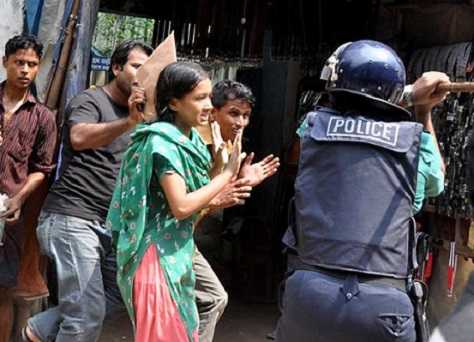
Police beat protesting garment workers in Dhaka (photo by Shahadat Hosen)
More than 50 people were injured in Dhaka on Monday after police moved in to break up violent protests by thousands of striking garment workers.
Hundreds of garment factories were closed for a fourth consecutive day as a result of the labor unrest.
The garment workers are demanding a monthly minimum wage of US$100, up from US$38.
Police say they moved in after protesters vandalized factories, blocked roads and smashed vehicles in Dhaka, and in the nearby Savar and Gazipur industrial districts.
At least 50 people were injured in central Dhaka after police baton charged and used tear gas and rubber bullets to disperse the protesters.
“We intervened when the protesters blocked the roads and started attacking vehicles,” said Biplob Kumar Sarkar, a Dhaka police official.
In Savar, workers from 10 garment factories went on the rampage before police brought the situation under control, said Mustafa Kamal, an officer at the local police station
In Gazipur, some protesters attacked a base of Bangladesh Ansar, a paramilitary force also known as Village Guards, looting rifles and ammunition and injuring five guards.
The government raised the minimum wage in 2010, but workers say the increase has been eaten up by a sharp rise in the cost of living.
“My husband and I both work in garment factories, earning just about 10,000 taka [US$ 125] per month. It is very difficult to maintain a decent life for a four-member family with that money”, said Suraiya Begum, a garment worker in Dhaka.
Labor unrest is common in the Bangladesh garment industry where workers work for low wages and in deplorable working conditions.
Recent tragedies including the Tazreen factory fire in November and the Rana Plaza collapse in April, which altogether killed more than 1,200 workers, have highlighted how bad conditions are.
The latest dispute stems from a recent proposal from by the Bangladesh Garment Manufacturers and Exporters Association (BGMEA) to raise the minimum wage to US$45, amid growing domestic and international pressure.
Defiant labor leaders rejected the proposal, calling it ‘ridiculous and inhuman’ and vowed to stage protests until their demands were met.
“Our backs are against the wall and we won’t back off until they pay heed to us,” said Nazma Akter, president of the United Federation of Garment Workers.
BGMEA vice-president Shahidullah Azim says the proposal is not final and there is time to reach an agreement.
“Workers must refrain from violence because it will do no good to the industry or workers. We can discuss things further and come to an amicable solution,” Azim said.


